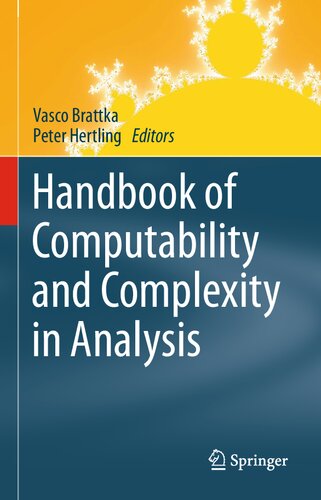

Most ebook files are in PDF format, so you can easily read them using various software such as Foxit Reader or directly on the Google Chrome browser.
Some ebook files are released by publishers in other formats such as .awz, .mobi, .epub, .fb2, etc. You may need to install specific software to read these formats on mobile/PC, such as Calibre.
Please read the tutorial at this link: https://ebookbell.com/faq
We offer FREE conversion to the popular formats you request; however, this may take some time. Therefore, right after payment, please email us, and we will try to provide the service as quickly as possible.
For some exceptional file formats or broken links (if any), please refrain from opening any disputes. Instead, email us first, and we will try to assist within a maximum of 6 hours.
EbookBell Team

5.0
50 reviewsMain subject categories: • Computability • Complexity • Analysis • Computable analysis
Computable analysis is the modern theory of computability and complexity in analysis that arose out of Turing's seminal work in the 1930s. This was motivated by questions such as: which real numbers and real number functions are computable, and which mathematical tasks in analysis can be solved by algorithmic means?
Nowadays this theory has many different facets that embrace topics from computability theory, algorithmic randomness, computational complexity, dynamical systems, fractals, and analog computers, up to logic, descriptive set theory, constructivism, and reverse mathematics. In recent decades computable analysis has invaded many branches of analysis, and researchers have studied computability and complexity questions arising from real and complex analysis, functional analysis, and the theory of differential equations, up to (geometric) measure theory and topology.
This handbook represents the first coherent cross-section through most active research topics on the more theoretical side of the field. It contains 11 chapters grouped into parts on computability in analysis; complexity, dynamics, and randomness; and constructivity, logic, and descriptive complexity. All chapters are written by leading experts working at the cutting edge of the respective topic. Researchers and graduate students in the areas of theoretical computer science and mathematical logic will find systematic introductions into many branches of computable analysis, and a wealth of information and references that will help them to navigate the modern research literature in this field.